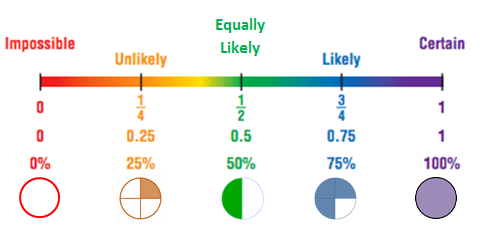Section 43 Probability: Terminologies

43.1 Explanation of terms
- Experiment
- An experiment or trial is any procedure that can be infinitely repeated
- It has a well-defined set of possible outcomes for each occasion
- An experiment is generally repeated in identical conditions
- A fixed number of repetitions of the same experiment can be thought of as a composed experiment, in which case the individual repetitions are called trials
- Outcome
- An outcome is a possible result of an experiment
- Random experiment
- An experiment that results more than one outcome
- Sample space
- The set of all possible outcomes of a random experiment is called the sample space of the experiment.
- The sample space is denoted as S.
- A sample space is discrete if it consists of a finite or countable infinite set of outcomes.
- A sample space is continuous if it contains an interval (either finite or infinite) of real numbers.
- Event
- An event is a set of outcomes of a random experiment.
- It is a subset of the sample space to which a probability is assigned.
Probability
- Probability is the measure of the likelihood that an event will occur.
- The probability of an Event is the number of ways the event occurs in a random experiment (n) divided by the total number of possible outcomes in a random experiment (N)
\[ \large Prob(Event) = \frac{n}{N} \]
- Probabilities can be written as fractions, decimals or percentages.
- In faction, it ranges from 0 to 1; starting at 0 (impossible) and ending at 1 (certain).
- The sum of the probabilities of all possible outcomes is 1